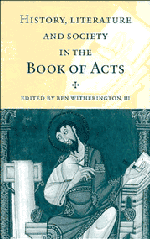Book contents
- Frontmatter
- Contents
- Preface
- PART I ISSUES OF GENRE AND HISTORICAL METHOD
- PART II HISTORICAL AND THEOLOGICAL DIFFICULTIES IN ACTS
- PART III ISSUES OF LITERARY CRITICISM
- 11 Internal repetition in Luke–Acts: contemporary narratology and Lucan historiography
- 12 Luke's characterizing use of the Old Testament in the Book of Acts
- 13 Editing the Good News: some synoptic lessons for the study of Acts
- 14 The means of absent ends
- Index of biblical references
12 - Luke's characterizing use of the Old Testament in the Book of Acts
Published online by Cambridge University Press: 02 February 2010
- Frontmatter
- Contents
- Preface
- PART I ISSUES OF GENRE AND HISTORICAL METHOD
- PART II HISTORICAL AND THEOLOGICAL DIFFICULTIES IN ACTS
- PART III ISSUES OF LITERARY CRITICISM
- 11 Internal repetition in Luke–Acts: contemporary narratology and Lucan historiography
- 12 Luke's characterizing use of the Old Testament in the Book of Acts
- 13 Editing the Good News: some synoptic lessons for the study of Acts
- 14 The means of absent ends
- Index of biblical references
Summary
Luke's adroitness as a littérateur has become a dominant theme in recent studies. As non-biblical literary criticism continues to inform the work of biblical scholarship, scholars working on Luke–Acts have begun to explore the masterful way in which Luke has framed the Gospel and the history of the early church. This chapter will join the discussion by analyzing one aspect of Luke's literary artistry; namely his characterizing point of view in quoting or referring to the Old Testament in the Acts of the Apostles.
Luke's use of the Old Testament has attracted considerable attention in recent studies. In particular, Joseph A. Fitzmyer has demonstrated convincingly that Luke sought to shape the account of Jesus and the early church in a fashion that imitated Old Testament historiography. Luke's Old Testament quotations come from the Pentateuch, the Psalms, and seven of the prophets. Surprisingly he rarely quotes the historical books directly, though his dependence on certain passages from these books is apparent (see below). Luke has so shaped his story in the manner of Old Testament language, themes, etc., that he appears to have intended consciously to write biblical history. He has imitated Septuagintal Greek, used Old Testament themes and models, and simulated biblical historiography with a high degree of literary sophistication.
Of course, the view that Luke–Acts is in some way a continuation of the biblical tradition (especially the Deuteronomist) is not new. But the details of that relationship have taken many forms.
- Type
- Chapter
- Information
- History, Literature, and Society in the Book of Acts , pp. 300 - 323Publisher: Cambridge University PressPrint publication year: 1996
- 2
- Cited by



